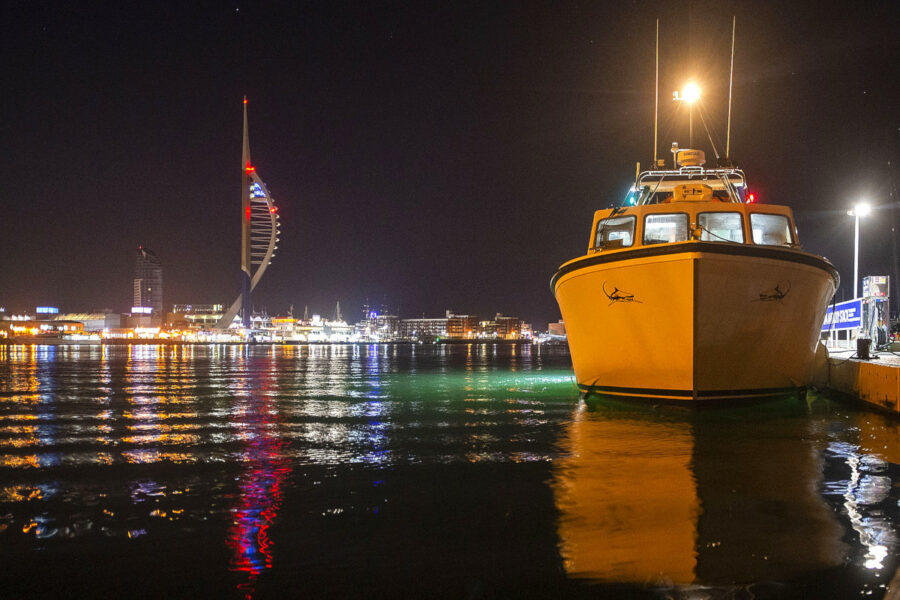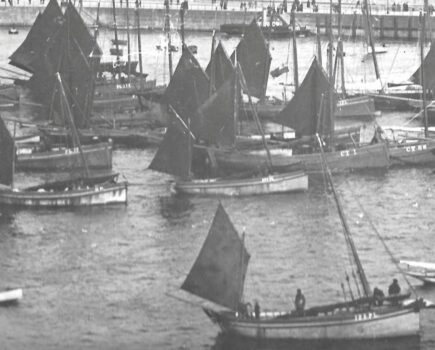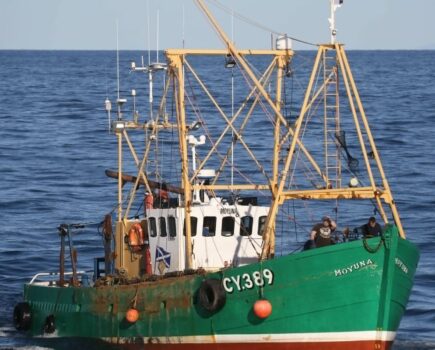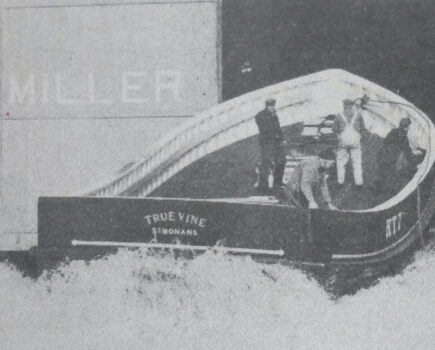Gosport single-handed skipper Ted Legg recently gave Fishing News the opportunity to spend a day with him onboard the Cygnus Typhoon Jenny G P 987, twin-rig trawling in the Solent, reports John Periam (Photos: Geoffrey Lee)
Ted Legg is an inshore fisherman who loves what he does, going to sea single-handed whenever the weather allows him to.
“I am the only person who chose to be a fisherman in our family, but it was the right choice. At the age of 10, how well I remember being taken into Poole harbour for a day’s fishing with one of my uncles. It resulted in a few fish, including some eels, being caught. Back home – we were living with my grandfather at the time – I decided to put the live catch into his bath. That was when I caught the bug to fish.”

Skipper Ted Legg.
Ted is a very independent person, and likes to take fresh challenges head-on. “There are two types of people in this world, ‘news readers’ and ‘news makers’. In fishing, you have got to make it happen for yourself.
“The whole concept of fishing is very challenging. Not only are there safety challenges to be faced, managing finances during the fluctuating fortunes experienced by small inshore vessels is often a challenge too far. After you start your career, you suddenly realise that not only do you face the dangers of the weather, but at any given moment DEFRA, the MMO or your local IFCA may be persuaded to minimise your opportunities of earning a living for you and your family.
“Maybe that is why we see so little recruitment into an industry that is under siege from so many conservation organisations.
“With any career, surely the aim is to move up the ladder to enjoy greater success. So let’s say you survive the learning curve of working on deck, you’ve been a skipper for a while, and suddenly, a brainwave. Why not purchase your own boat? Let’s use all of our self-belief and reap the rewards of being the owner.
“Off to the bank to finance your business plan. If you are honest about the opportunities, surely someone is going to jump at the chance of lending you £250,000 to buy the boat, licence and entitlements you will need to sustain a successful business?
“I was lucky at the start of my career, because fishing opportunities were abundant, and as a result, a number of my ex-crew members went on to own their own vessels. One, in particular, managed to put up with my extremely high levels of commitment for 13 years, and is now the owner of two vessels. However, during the past 18 years, on leaving my vessel only one crewman has had the courage to stay in the industry. A sign of the times.”
Ted is one of seven fishermen and 10 vessels based in Gosport. He is a skipper/owner of two vessels based at the town’s marina. There are two mooring areas – Ted is at the marina, and most of the others are on a swinging mooring at the Hardway further down the estuary.
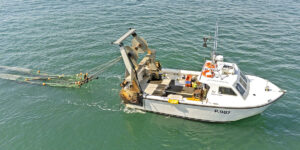
Jenny G hauling her twin-rig trawl gear.
“What helped me make this mooring decision relates to an amusing story,” said Ted. “In the early days, I shared a dinghy to get out to the further moorings. On one cold morning, facing into a lumpy swell caused by a fresh northeasterly breeze, my crew and I set off in the dinghy, with boxes of ice and lunch bags, towards the boat. As more and more water came over the bow, the dinghy and contents sank slowly beneath the waves.
“I have never confessed to being a strong swimmer, and had it not been for the size of my crewman’s lunch bag and the buoyancy it provided, I may well not have made it back to tell this story today. I eventually arrived home covered in mud, and with a positive decision that in future (even if it cost a little more), to have a fixed mooring berth at Gosport.”
Trawling
The Fishing News trip started at 5am, when Jenny G left the marina, before passing Portsmouth naval dockyard to port and heading east out into the Solent, on a fine late summer’s morning with a light northeasterly wind and temperatures rising to 18°C.
Ted is very safety-conscious, and a full safety briefing was given before he refuelled Jenny G for the day’s fishing ahead.
He is also a very sustainable fisherman, and knows these waters well, having fished them for so long. For this trip, he went down towards Selsey and Bognor Regis.
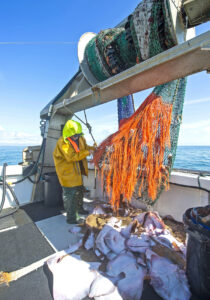
Releasing the port codend.
“I often prefer this, rather than to go out to sea a lot further. It’s not uncommon to travel on a 50-mile round trip to secure a day’s money. However, there are good opportunities closer to home if you pick the right moment. Our trawling is now all near the coast, especially since the new bass regulations require no specific targeting of sea bass by trawl gear,” he said.
About three miles off the south coast, Ted shot the twin trawls off the raised net drum before connecting the short 4m bridles worked on soft bottom to a set of No. 3 Bison trawl doors and a 90kg middle roller clump. These, in turn, were connected to the main trawl wires by a pair of 15-fathom splits. When the gear was all square on the bottom with 20 fathoms of trawl wire shot off the two-drum Spencer Carter winch, Jenny G towed for about four hours at a steady 1.75-2.5 knots on an east/west track, at a depth of between 6.4 and 7.8 fathoms.
With the weather being fine, Ted was able to spend up to 11 hours at sea before returning to Gosport. There was only one haul, so putting Jenny G in the right place was of paramount importance – which is where Ted’s working knowledge of the area came into play. When the gear was hauled and the contents of the codends released, the catch consisted of a mix of small-eyed rays, blonde rays, plaice, brill and gurnard.
Heading back at a steady seven knots, Ted sorted and gutted the selected fish, including cutting the wings off the skate, before washing down the deck, ready for another day’s fishing.
On completion of this work, he then filled out Jenny G’s catch logbook. Ted is currently one of the trial users of the Marine Management Organisation’s new electronic catch reporting app on his second vessel, Secret Star. Using this will soon be compulsory before arriving at port.
“Paperwork is important, and although many fishermen are not happy with the amount they have to do, I find that if you keep on top of it all the time, it makes life a lot easier,” said Ted. “It’s the same as paying one’s bills at home. If you don’t, then issues can arise.”
Once back at the marina, the boxed catch was taken ashore and placed in the cold store, ready for collection by Shoreham-based Brighton and Newhaven Fish Sales, which Ted has used for years.
“My catches are collected, which helps a lot, and makes life a lot easier after a long day at sea,” he said.
Supporting the industry
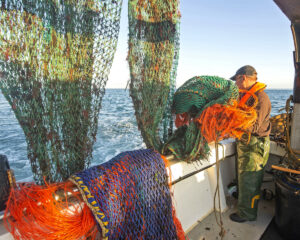
Preparing to shoot the eight-fathom twin-rig trawls.
Ted is very keen to work hard for the local fishing community. “We try to work together, and of course there is competition between us. Rest assured, in times of need we can come together to sort out any major legislation issues.
“A typical case was when we had to deal with the National Grid over the interconnecting cable coming from France. We had a positive outcome with that, because we formed a working group and were able to show our valid concerns over the project.
“Working with the MMO and the Southern Inshore Fishing and Conservation Authority (IFCA) is important. There are rules and regulations, but at the end of the day, if we can work as a team, it makes life a lot easier. When it comes to quotas, I am in the over-10 non-sector pool and the under-10 non-sector pool, due to owning two vessels, and I have more than enough quota for the opportunities that I have to go to sea.”
Fishing in the Solent area is not as straightforward as it might be in other parts of the country. Although there are sheltered waters, there is a tremendous lot of weed, and on some evenings, a 20-minute tow is all one can do before the nets get full of it.
Dredging by Associated British Ports (ABP) has caused some concerns. Making way for some of the larger new container ships has taken away some of the intertidal and subtidal mud in an important Manila clam fishery, resulting in a catch reduction.
Working together with Southern IFCA, fishermen can now manage what is left, as they have done with the fishery in Poole, restoring it to a more valuable fishery. It is now sustainably fished, with product quality in line with market requirements.
Ted says that people often ask him what the point is of being on the Southern IFCA committee. “When it comes to a vote, if I have a personal involvement, I don’t get the option to vote. Where I can help is with my expertise as a working fisherman. This can help others who know little about the management of the industry in our specific area.”
South Coast Fishermen’s Council
One thing that is unique about the area that Ted fishes in is the organisation of a group of people who have got together and formed the South Coast Fishermen’s Council. This comprises local fishermen from across the region, business people associated with the industry and ports, and Southern IFCA’s chief fisheries officer Robert Clark. They meet every few months, and work hard to make their part of the coast a dedicated fishing area, run by the fishermen, for the fishermen.
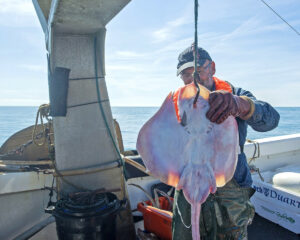
Cutting skate wings…
“We can keep up with new legislation, and support others in trying to understand it,” said Ted. “We can also get regular updates from the IFCA on new byelaws and proposed changes – in doing this, we can help to produce compromises that offer a satisfactory solution to all stakeholder groups, and work with them in making moves that benefit all parties.
“I believe we have one of the best-run IFCAs in the UK, with the very supportive CFO Robert Clark at the helm. We make a point of sharing our experiences with other inshore UK regions, including their relevant MMO and IFCA offices. We have had success regarding this, and hopefully can share our concerns with others, before some fisheries are damaged beyond repair.
“What has happened within this organisation is that we are not afraid to work with senior officers from within the governing bodies. We invite them to join our meetings and, for example, we have an excellent working relationship with Paul Johnson, principal marine officer of the MMO South and East Marine Area. He gets things done. We are lucky to have Paul on the south coast, and he can keep us abreast of new legislation.”
Wind farms
In keeping with many other fishermen, Ted Legg is not keen on wind farms, and shares their concerns about the effect they have, both on stocks and the seabed environment. At the moment, wind farm development has not been a major issue within the Southern IFCA region, as it is in some other areas. However, looking into the future, if the development of MPAs continues, Ted can well see that in the long term, Southern IFCA will have conservation zones to monitor, with no fishermen.
In some areas, situations are already being reported of low fish stocks, clear waters that were not there before, and seabed disturbance, due to the turbines. “If you ask 10 different people for their opinions, you will get 10 different answers. For example, do they scare fish off, why can’t you fish within the farm areas, and what about the noise from them? Cases have been reported of vessels vibrating when near them. More research needs to be done!”
Sustainability
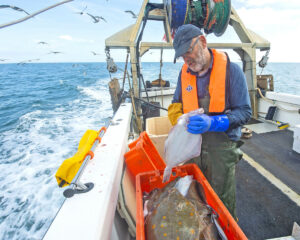
… and gutting plaice, while heading back to Gosport.
In fishing today, one has to be a lot more selective about what area one fishes in. Ted knows his area well, and on this trip, he fished an area he knows well, but does not fish on a regular basis. There is a large expanse of sea out there, and Ted works hard to select where he fishes. Breeding plays an important part, and to overfish benefits no one at all. Ted can work with his quotas, as he has two vessels.
People forget that weather plays an important part when it comes to a day’s fishing. They say a lot of trawling damages the seabed. That’s wrong if you compare it with the effects of weather – a southerly force nine to 10 wind causes more action on the seabed than 1,000 trawlers create in a whole year.
“We are controlled by the EU at the moment, and like many of us, I am getting more confused each day by the Brexit charade,” said Ted. “If we can monitor our own fisheries, we will, I am sure, have the sustainable fishery we want. I am worried about what people see of our involvement as far as environmental impact is concerned, as represented by those living onshore and putting conservation before everything, with little knowledge of just what we are doing as fishermen. The addition of new MCZs in some areas, more of which fall inshore, will, of course, have effects on how we are able to fish.
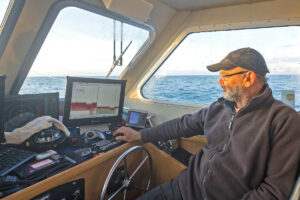
Setting course east along the south coast, at a steady seven knots.
“The burdens we now have to deal with each day are forcing us to look to what future we will have. Sometimes, too many new regulations, placed by those who sadly know little about the fishing industry and its impacts, are causing many to wonder if we have a future.
“Empty pontoons say it all, and there are now plenty of those around our coasts.”
Spending time at sea with Ted, one can understand why he has such strong views about the industry. He started at the age of 10, and has succeeded through his single-minded determination to survive and invest for the future. Where many have not survived, Ted has been able to, by helping others understand just what is involved in his work. He hit the nail on the head with his concerns over people behind the scenes, who do not know just what a fisherman does to earn a living wage in the most dangerous profession anyone can work in.
If more regions around the UK followed the example of the South Coast Fishermen’s Council, they could well see their lives taking a turn for the better. Ted is keen to share his expertise with others who are prepared to sit down and face the current challenges head-on.
That is not a lot to ask – is it?

